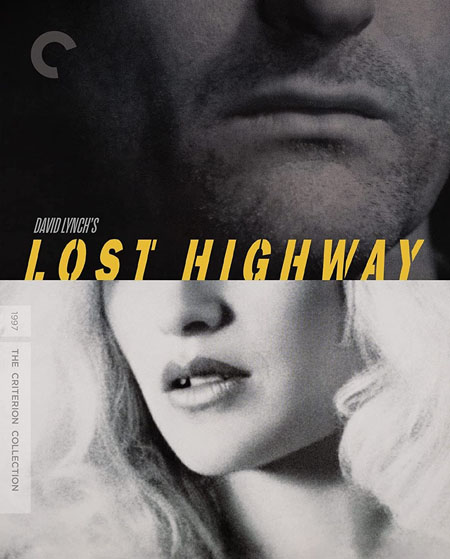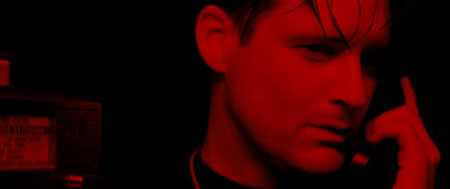
“A
FEAR OF FUGUES”
By
Raymond Benson
David
Lynch’s challenging 1997 feature, Lost Highway, has had a tortured home
video release history. After an initial VHS release, and then one on DVD,
rights issues and a lack of interest by media companies prevented a Blu-ray
release in the USA for many years. Less-than-ideal quality imported Blu-ray
editions from various countries were circulated among Lynch fans and collectors.
Kino Lorber finally put out a decent Blu-ray in 2019, but it was criticized by
home video review sites and by Lynch himself as having inferior quality, as it didn’t
go through the stringent approval process to which the director was accustomed.
Cinema Retro reviewed that edition, finding it not terrible and
certainly adequate enough since it seemed that it was all that we were ever
going to get.
Now,
however, The Criterion Collection has issued a new, director-approved 4K UHD
edition that is an astonishingly gorgeous digital restoration with a new 5.1
surround DTS-HD Master Audio soundtrack and an alternate one of uncompressed
stereo. Criterion’s Lost Highway can be purchased as a 2-disk set
containing a 4K UHD disk of the film alone plus a Blu-ray disk of the film and
all the supplements, or in a single disk Blu-ray package.
Much
of what this reviewer has to say about the film itself is repeated from the
earlier 2019 review.
Lost
Highway is
a disturbing and surreal work of art from Luis Buñuel’s heir apparent,
and it’s a doozy. Lynch described the film as a “psychogenic fugue,” which is a
fancy term for a dissociative disorder. The story concerns musician Fred
Madison (Bill Pullman), who is having marriage trouble with his beautiful wife,
Renee (Patricia Arquette). An outside force seems to be watching and harassing
the couple by leaving intimate videotapes of themselves on their
doorstep. Throw in some nightmares and the appearance of a “mystery man” (the
very creepy Robert Blake) with powers that could only exist as dream logic, and
Fred eventually loses it. Suddenly he’s arrested for killing his wife. But
then—uh oh—while he’s sitting in a jail cell, he becomes… someone else.
The cops find Pete Dayton (Balthazar Getty) in Fred’s place. Puzzled, they let Pete
go, since he’s not the man they want. Now there’s a kind of alternate universe
thing going on, because Patricia Arquette now plays Alice, the mistress of the
cruel Mr. Eddy (Robert Loggia), who may in truth be a porn producer named Dick
Laurent.
Confused?
Many audience members were baffled at the time of Lost Highway’s initial
release. The picture marked the first in what might be called the “fugue
trilogy” (the other parts being Mulholland Drive and INLAND EMPIRE),
in which main characters become other people during the flow of the tales.
After a second or third viewing and examining Lynch’s narrative conceits in the
other movies, one can get a sense of what it’s all about.

And
this reviewer is not going to tell you. Just know that Lost Highway is
about a man who murders his wife, and he is unable to live with himself—or
inside his own mind—because of it. The film generates a good amount of dread,
and it is pure Lynch. It marks a transition from earlier, more
narrative-friendly pictures, to more dreamlike, experimental works of art that
defy description—other than that they are “David Lynch Films.”
Peter
Deming’s cinematography is fully exploited in Criterion’s new restoration. His
use of light and shadow is remarkable, and the bits in which Fred walks into a
dark hallway and disappears, and then later reappears from the
blackness, are canny metaphors for the themes in the movie.
As
opposed to the earlier Kino disk, Criterion has included some choice
supplements. Most notable is the 1997 feature documentary, Pretty as a
Picture: The Art of David Lynch, which served as a behind-the-scenes
“making of Lost Highway” piece as well as a look at Lynch’s career as an
artist (painting/sculpture) and filmmaker. Highway cast members and crew
are interviewed along with Lynch himself, and there are clips from earlier
films, too. An audio-only excerpt from the audiobook of Lynch and Kristine McKenna’s
biography, Room to Dream, covers the period in the mid-90s when Highway
was made. Two archival featurettes about the making of the film and
interviews with cast/crew are also welcome. The theatrical re-release trailer
rounds out the package. The booklet feature interview excerpts from the
publication Lynch on Lynch. Note that the feature film does not have
chapter breaks, in keeping with other Lynch-approved Blu-ray and DVD releases.
Lost
Highway has
become more mysterious and admirable with age, and Criterion’s new release does
the work justice. For fans of David Lynch, dark—very dark—crime dramas,
surreal cinema, and bravura filmmaking.
Click here to order from Amazon